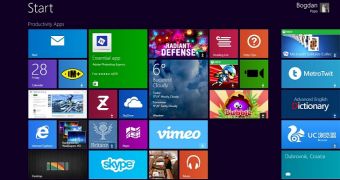Windows 8.1 is available in multiple SKUs right now, namely Windows 8.1 Core, Windows 8.1 Pro, Windows 8.1 Enterprise, and Windows RT 8.1, but the Enterprise version has until now been available only as part of the Microsoft Software Assurance volume licensing program.
Starting with March 1, small businesses too can get Windows 8.1 Enterprise because Microsoft is planning to release a standalone version of the operating system.
A company spokesperson has already confirmed for ZDNet that this is going to happen in early March, which means that Windows Enterprise will thus become available to virtually anyone in just a couple of days.
“We have heard from customers of all sizes who could benefit from being able to use Windows Enterprise and we have responded to that feedback with the availability of Windows Enterprise as a standalone upgrade option,” a Microsoft representative was quoted as saying.
“Additionally some customers per internal policy are unable to enter annuity agreements. This change expands the availability of the Enterprise edition to now include these customers. Windows Enterprise will be available as a standalone upgrade SKU in the Open and Select/Select Plus programs beginning March 1, 2014.”
The differences between Windows 8.1 Pro and Enterprise come down to just a few features, as the latter integrates Windows To Go, AppLocker support, DirectAccess, BranchCache, and better VDI features.
Windows 8.1 Enterprise is particularly important for Microsoft, as the software giant remains a company focused on enterprises and products that could help it become a devices and services firm.
New CEO Satya Nadella said that paying much more attention to the consumer business is a priority right now, but there’s no doubt that the enterprise is still playing a key role for Microsoft and the company will continue to monetize this side of its business as much as possible under the new administration.
Former Microsoft CEO Steve Ballmer said in mid-2013 that the software giant’s business was indeed more focused on enterprise than on the consumer business, with a chart presented to financial analysts clearly showing that, as far customer segments are concerned, enterprise is still number one.
According to those charts, the enterprise market was generating 55 percent of Microsoft’s revenues, while the consumer business only represented 20 percent of the company’s target. The rest of 19 percent was brought by OEMs, as they still are an important partner for the software giant.

 14 DAY TRIAL //
14 DAY TRIAL //